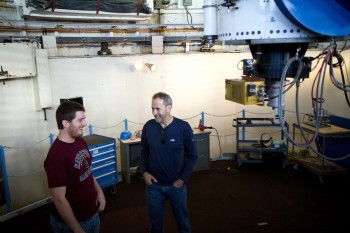Astronomy Professor Stephen Boughn Retires

Stephen Boughn (right) on a 2012 field trip to Kitt Peak National Observatory in Arizona with Haverford astronomy students.
Details
After 28 years at the College, John Farnum Professor of Astronomy Stephen Boughn is retiring from the classroom. Colleagues, friends, and family got the chance to celebrate the man and his career in April, at a daylong symposium on campus that featured talks by some of his astrophysicist pals as well as former students who are now scientists themselves. Boughn will be heading off to Princeton University for a final sabbatical year before his“official” retirement, but we caught up with him for a chat about his nearly three decades at Haverford.
What he enjoyed most about teaching here: The wonderful students and the small venue. Before I came here, I taught in the physics department at Princeton, which had 50 physicists. One of the most enjoyable things about Haverford is that most of the people I have gotten to know aren't physicists or astronomers, or even scientists. It was such a joy to go to the faculty dining room—when we still had a faculty dining room—and sit down with historians, and political scientists, and anthropologists.
Most memorable class: The freshman seminar in astrophysics. I had students do the readings and complete the assignments before they came to class, which met every other week. The class was more of a workshop, where students would get up in groups of three or four and present on some really high-level concepts, like cosmic rays, the big bang, the temperature of stars. If a visitor ever walked into the room, I'm sure it would have looked like total chaos. The students were all talking, and I was going around the room encouraging the quiet ones, because to get the most out of the course you really had to get in there and argue with your teammates.
What he would say to a student considering coming here to study astronomy: This is a very good place. When we hired [Assistant Professor of Astronomy] Beth Willman in 2008, we had to make a case for that hire, so I did my due diligence and looked back 20 years at all of our astronomy majors who had gone to graduate school or gotten a doctorate. What we found was that 1 percent of all astronomy Ph.D.s and Ph.D. candidates in that period came through our program. That certainly wasn't all me. My astronomy colleague Bruce Partridge had nurtured the program since he arrived in 1970, and Louis Green before him. And now with Beth, who is internationally known already, and with [Assistant Professor of Astronomy] Desika Narayanan, who is a brilliant young theorist, I don't see that number going down. Just two years ago, we had a bumper crop of eight astro majors. Six of them were women, and five of those young women are now in programs at some of the best grad schools in the country.
When he decided to become an astrophysicist: I was a freshman in high school. I read this little book on Einstein's theory of relativity. It was by Lillian Lieber. I still remember it.
What you might be surprised to know about him: I am an astronomy professor who has never taken an astronomy course in my life. Astrophysics is, in some ways, a subfield of physics, so it's not all that unusual. There are a lot of astronomers, especially those my age, like me.
Scientific discovery he's most proud of: I worked with a scientist who was a young postdoc at Princeton at the time on something called the Integrated Sachs-Wolfe effect. Our work helped provide an important piece of evidence that confirmed the accelerated expansion of the universe. When I started out to do that experiment, I dearly would have loved to find evidence refuting the acceleration of the universe. But it's the standard cosmological model now. Though I'm a skeptic. I wonder if there is still something we haven't figured out.
—Eils Lotozo



